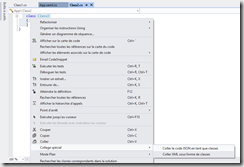If you need to use data formatted with the JSON standard, here is a simple trick to get started (but you can complicate it as you wish ;)). I use the Web Essentials extension and the NuGet package Json.NET. The JSON data file I use is this one: Example JSON File (source).
Here are the steps to take the JSON data, generate the necessary classes, download the data, and populate these new classes:
- Install the Web Essentials extension
- Create a new class file
- Put a snippet or the entire JSON data into the clipboard (Copy or CTRL-C)
- Right-click in the editor or go to the EDIT menu/Special Paste and select “Paste JSON as Classes”
This will create classes from the JSON code. In our example, this gives the following classes:
public class Rootobject
{
public Items items { get; set; }
}
public class Items
{
public Item[] item { get; set; }
}
public class Item
{
public string id { get; set; }
public string type { get; set; }
public string name { get; set; }
public float ppu { get; set; }
public Batters batters { get; set; }
public Topping[] topping { get; set; }
public Fillings fillings { get; set; }
}
public class Batters
{
public Batter[] batter { get; set; }
}
public class Batter
{
public string id { get; set; }
public string type { get; set; }
}
public class Fillings
{
public Filling[] filling { get; set; }
}
public class Filling
{
public string id { get; set; }
public string name { get; set; }
public float addcost { get; set; }
}
public class Topping
{
public string id { get; set; }
public string type { get; set; }
}
Next, we need to download this file from our application to display/process the data. To do this:
- Add the NuGet package Json.NET
- Add the following usings:
- using Newtonsoft.Json;
- using System.Net.Http;
- Use HttpClient and Json.NET to fetch the JSON data and populate our classes
private static async Task<Rootobject> GetData()
{
HttpClient client = new HttpClient();
var response = await client.GetStringAsync("http://www.gabrielmongeon.com/public/blog/donuts.js");
var root = JsonConvert.DeserializeObject<Rootobject>(response);
return root;
}
There you go, you have a data structure filled with data from JSON. All that’s left is to find/create a data source and display/format this data in your application.
Happy coding!
